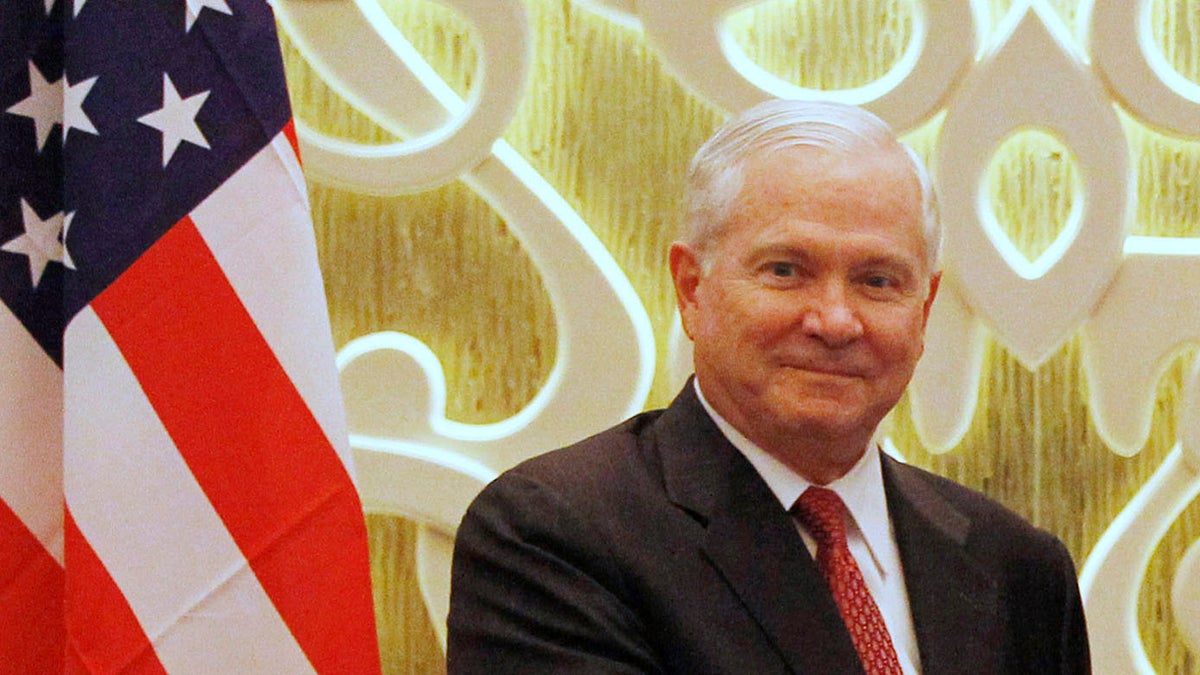Robert Gates, in the tradition of kiss and tell

Former U.S. Secretary of Defense Robert Gates (Jason Reed, AP Photo Pool)
Gee, what a shock. A high-ranking presidential appointee has written a book dissing his boss.
The underling says in his book that he’s very disappointed in the president, that the president is not really the man or the leader he was cracked up to be, that the president is actually kind of indecisive and at sea with his own policies….So wrote Ronald Reagan’s former chief of staff, dissing the boss in a vicious 1988 book while Reagan was still in office.
Point is, the newly released memoir by ex-Defense secretary Robert Gates, which duly disses President Obama, is yawningly within the tradition of Washington kiss-and-tells. These memoirs – massive selfies that should all be entitled “If Only He Had Listened More To Me” – have become de rigueur during the past quarter century. Sometimes they generate a few days of buzz; most times, they have the life span of a fruit fly.
Conservative talking heads are predictably ballyhooing Gates’ buzzbits – Obama didn’t have faith in his own Afghanistan policy! Joe Biden was always wrong! Agreements with Obama’s White House “were good for only as long as they were politically convenient”! – and behaving as if we have never heard an ex-insider talk smack before. Well, excuse me for laughing so hard that I risk fracturing my polar vortex. Truth is, talking smack is what former loyalists do. Gates may well be right when he faults Obama for “micromanagement,” but every administration has been disharmonious, every president has disappointed his courtiers. Even back in the 1790s, Thomas Jefferson was constantly miffed that President Washington favored Alexander Hamilton’s views over his.
But until well into the 20th century, disenchanted White House insiders stayed mum. It was deemed a breach of protocol, a sign of disrepect, to diss a president for whom one had worked. One of the first breachers was Raymond Moley, an early architect of the New Deal, who wrote a scathing 1939 book about FDR after he was eased out of the administration. (FDR subsequently called the book “a kiss ass and tell.”) Then, in 1962, a former Dwight Eisenhower speechwriter, Emmet John Hughes, wrote an unflattering memoir that questioned Ike’s political smarts. Ike had left office a year earlier, but the mere existence of the book ticked people off.
Four decades after that kiss-and-tell was published, memories were still raw. An ex-Eisenhower aide, Stephen Hess, told me in 2004, “We felt it wasn’t appropriate for an Eisenhower book to come out before Eisenhower himself wrote his own. We thought (the Hughes memoir) was in bad form. That just shows you how far we’ve come. Today, there has been a breakdown of institutional loyalty.”
Gerald Ford’s press secretary quit and wrote a 1976 book that depicted his ex-boss as weak (“flip-flopping was not Ford’s strongest suit”), but the real breakdown occurred during Ronald Reagan’s presidency. Budget whiz David Stockman, who had helped sell the Reagan tax cuts and supply-side Reaganomics, wrote a 1986 memoir trashing those same policies.
And in 1988 Donald Regan, the former chief of staff, wrote his memoir, depicting the sainted conservative president as a hapless captive of his wife Nancy, who allegedly made “every major move and decision” after consulting her astrologer. Worse yet, the president was allegedly so disengaged that, in any given month, he spent “minutes rather than hours” on key national security issues. Indeed, “it was a rare meeting in which he made a decision or issued orders.” And that assessment was echoed in a memoir by ex-Secretary of State Alexander Haig, who called Reagan’s White House “a ghost ship.”
During the ’90s, some of Bill Clinton’s disappointed underlings meted out similar treatment. George Stephanopolous wrote a memoir assailing Bill’s “shamelessness,” pollster-huckster Dick Morris wrote that Bill had a split personality, and former Labor Secretary Robert Reich (who was ticked that Bill didnt tackle income inequality) wrote that the boss was just a political animal, somebody who wanted suburban voters “to buy him like they buy toothpaste.”
George W. Bush got peppered the same way. His ex-Treasury Secretary, Paul O’Neill, wrote a memoir that described Bush as a disengaged dolt, somebody who presided over Cabinet meetings “like a blind man in a roomful of deaf people.” His ex-counterrorism chief, Richard Clarke, wrote a memoir depicting Bush as soft on the pre-9/11 threat from Osama bin Laden, and fixated post-9/11 on invading the wrong country. Ex-Ambassador Joe Wilson wrote a memoir describing a vengeful Bush team that outed his wife’s CIA identity in retaliation for Joe’s public questioning of the march to war in Iraq. Another disillusioned Bush hire, faith-based iniatives expert David Kuo, wrote a memoir contending that Team Bush cynically exploited faith-based voters for political gain (“The name of God is just being destroyed in the name of politics”).
Wait, Kuo said that Bush made decisions “in the name of politics”? Sounds like the new claim that Obama’s decisions are “politically convenient.” Wow, political leaders engaging in politics…imagine that.
So forgive me if I am less than galvanized by Bob Gates’ kiss and tell. Odds are, it’s destined for the remainder bin at your local struggling bookstore. The same bin that once held the Dick Morris memoir, which at least had a buzzy tidbit about how Clinton and his pollster got into a fight on the kitchen floor. Betcha Bob can’t top that one.
——-
Follow me on Twitter, @dickpolman1
WHYY is your source for fact-based, in-depth journalism and information. As a nonprofit organization, we rely on financial support from readers like you. Please give today.

